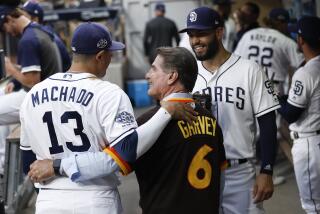Mike Gravel’s ripple effect
IN MANY ARTS, such as painting, poetry, woodworking and arrogance, Americans have made significant contributions. We have few rivals when it comes to growing marijuana or blowing stuff up. But in one art we are as inventive as small appliances or perhaps cucumbers.
I speak of the art of political advertising. American politicians expend untold billions of dollars on campaign commercials. Not only do these ads all appear to have been produced by the same vicious idiot, it appears that this vicious idiot has been lobotomized and then repeatedly, thoroughly concussed.
That is why as Americans we all owe a debt of aesthetic gratitude to the genius of former senator and current Democratic presidential candidate Mike Gravel, who has taken the pabulum and kitsch that is our political art and transcended it — swept it up, summarized it and broken through it into a new range of possibilities. Mike Gravel is to political advertising what Ralph Waldo Emerson is to the essay, Walt Whitman to poetry, Jackson Pollock to painting, 50 Cent to bullet wounds. He is the avant garde of the new artpolitical era.
The medium of Gravel’s genius is YouTube, but he ought to be on every cable network and broadcast channel in the country. In one ad, he appears in front of a pond. He stares at the camera for about a minute, just squints at us all, confronting us with the very essence of human existence. His silence, it emerges on a careful listening, is infinitely more expressive than the words of Hillary Clinton or Barack Obama, and is a bolder and more precise formulation of policy initiatives. Then Gravel picks up a rock and throws it into the pond. Then he walks slowly away.
In another ad, Gravel gathers firewood. Then for about seven minutes we simply watch a fire burning.
These are Dadaist campaign ads, as revolutionary in their context as Duchamp’s urinal, Warhol’s Marilyns, Washington crossing the Delaware, Bugs Bunny’s attack on Elmer Fudd. But how are they to be interpreted?
Chucking a rock into a pond and lighting a fire are acts with extreme symbolic resonance. As Gravel’s act ripples over the world’s waters, growing ever less sizable until a single molecule washes up in New Zealand, his message or his messagelessness permeates the entire environment, undetectably changing everything. Perhaps Billy Joel — who should be writing music for the Edwards’ campaign — didn’t start the fire. But Gravel did.
These “symbolist” readings are, however, impoverished. I prefer to think of it like this: In American politics, language has been so emptied of meaning that silence is the only remaining medium of expression. Spend the next 20 years debating whether the immigration bill = amnesty; meanwhile, people, as Gravel shows us with unremitting clarity, are still crossing borders. Gravel’s works bring us out of the yapyap — the blah, blah, blah, yackety, smackety, if I may — and back to the things themselves, the reality that exists before and outside our words, the reality that eventually shuts us up or kills us.
The ads are both a commentary on the emptiness of our political discourse — a parody if you like — and a refutation of that emptiness, or a triumph over it, a reinsertion of brute content, a silent explosion of truth into a world of mere and moronic fiction.
Our politicians are voids or spreading zones of emptiness, a set of focus-grouped phrases and nice outfits, a congeries of cliches, representations of which there is no reality. In the terms of the late theoretician Jean Baudrillard, our politics is a precession of simulacra.
But Gravel’s politics reminds us that if someone were to drop an anvil or a piano on you from a tall building, you would amount to a puddle. Gravel’s works confront us with our own existences and our deaths, the brute thereness of truth, the skull beneath the $400 haircut, the cellulite under the pants suit. His is neo-existentialist, post-apocalyptic, post-post modern art, a silence that screams and cajoles.
Gravel’s politics are a politics of the body and of the physical world, of what is underneath our language and above it, what is broken and beautiful, the real world of human beings.
I suggest to you that a Gravel presidency would lead to an entirely new America, doing to us what cubism did to post-impressionism: dragging us moaning in glorious epiphanic pain into a new world.
It may be that Gravel, like Vincent van Gogh, Friedrich Nietzsche or indeed, Crispin Sartwell, is a premature birth of an astonishing future. He may toil in obscurity, misunderstood or ignored in his own time. And yet, whether we can fully theorize him or not, Mike Gravel, though he may never be president, has brought us all to the very brink of political ecstasy.
More to Read
The biggest entertainment stories
Get our big stories about Hollywood, film, television, music, arts, culture and more right in your inbox as soon as they publish.
You may occasionally receive promotional content from the Los Angeles Times.










